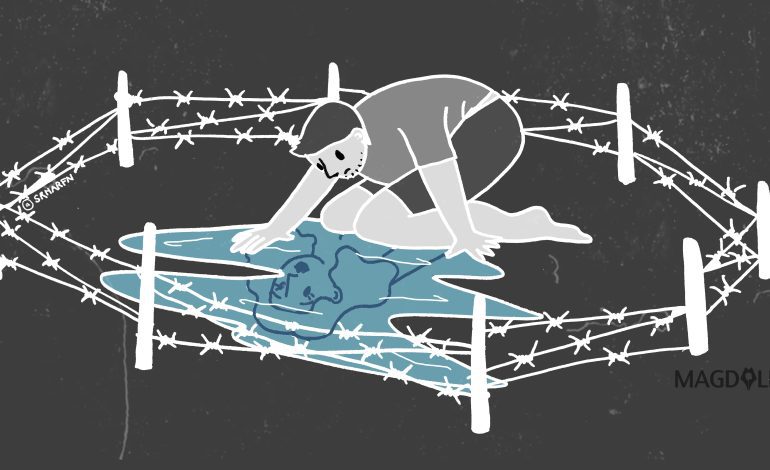The Vicious Cycle We Have Created for Transgender Women in Indonesia

In 2012 for the first time I got in touch with an organization that works for transgender women’s rights in Jakarta, and an interaction with one of the transgender women in the organization left me stunned. A young and naïve transgender girl at the time, I was interviewing the community in Jakarta for my undergraduate thesis. After an interview, I was chatting with a middle-aged transgender woman who had come to the office with her partner.
“Why are you pursuing higher education?” she asked. “Don’t you just want to join me and hang out at the train station? I’m not the kind of senior who will forbid you from joining us there.”
I was shocked and disappointed at the time. Back then I was studying psychology with the hope of having a bright future. Hearing that from an older transgender woman made me wonder: Are all transgender women in Indonesia fated to such a dark future? Will transgender women continue to be excluded without a chance of being integrated into society? Are we really not allowed to pursue our dreams like other people?
The answer is likely “yes,” because seven years since then, the situation for transgender women in Indonesia has not getting better. In fact, it has gotten worse.
In 2018 transgender women were targeted in many acts of violence in Indonesia: publicly humiliated, strip naked with their hair shaved in Aceh; hosed by a fire truck in Lampung; beaten on the night of the celebration of Prophet Muhammad’s birthday in Jakarta.
The increased violence corresponds with the rising trends of government officials making homophobic and transphobic statements, which led to the justifications of violence against sexual minorities, especially transgender women.
But is violence against transgender women surprising? Sadly, no.
Transgender women in Indonesia have been experiencing systemic violence since the 1970s, when they were not even allowed autonomy to self-identify. The preferred term “wadam” – a portmanteu from Hawa and Adam (Eve and Adam) – was banned because it is made up of the names of two prophets (hence the term “waria”, wanita pria or female male), evidence of failure to recognize their freedom to decide their own gender identity.
The Indonesian Council of Ulemas issued a fatwa or decree to ban transgender women in 1997. Many events organized by transgender groups were dissolved for the reason of public decency – even those organized the by National Commission on Human Rights to address the human rights aspect.
The pattern of discrimination and justification of violence through transphobic policies in the past have never been addressed because the lives of transgender women and their wellbeing have never been considered important. Transgender women are seen as deserving of the abuses and discrimination because of their non-conforming behaviour.
This is why I am no longer surprised that many members of the transgender community find it hard to see the light at the end of the tunnel. This attitude creates a vicious cycle for the transgender community, many of whose members see pursuing education as something useless because people would never appreciate them, anyway. There are individual exceptions, but most survive by keeping their heads down.
The narrative of ‘know your place and don’t ask too much’ comes from our failure to accept and respect the autonomy of transgender individuals to identify themselves with their preferred gender identity.
As someone who studied psychology, I believe in the importance of acceptance of the family. Family is the first social agent to help a transgender person feel accepted. Concept such as unconditional love, respect, honesty, integrity, responsibility, sense of independence, work ethicss are important to pass on to transgender members of the family and help make them feel safe and respected. It helps develop a healthy self-esteem and prepare them for this hostile world.
Unfortunately, making parents realize that there is a future for their transgender children is such a hard work in Indonesia. Part of the difficulty has to do with countering the narrative that teaching children to be themselves is harmful. People are reluctant to support their children to be themselves, as they may be accused of “LGBT-fying” their kids, which could not be farther from the truth.
Another important factor is the integration of transgender women into the women’s movement, because many of the stigmas against transgender women are similar to those against cisgender women. The stigma that transgender women can only work in stereotypically feminine occupations comes from the assumption that transgender women are only “copies” of cisgender women, so they can only do what cisgender women are traditionally “destined” to do.
This stereotype and assumption are rooted in the perception that cisgender women are incompetent, so “their copies” would be even worse. Also, transgender women are perceived to undergo transition merely to fulfil the desire and sexual phantasy of men. This perception has its origin in the belief that cisgender women are the object of pleasure of men.
Cooperation between transgender and cisgender women can help make the movement stronger. Failure of integration reaffirms the patriarchal belief that women can only compete against each other. Exclusion of transgender women in cisgender women’s movement can undermine women’s movement, as it confirms that women are incompetent, emotional and unfit to work outside the traditionally expected roles and subject to the objectifying gaze of men. In addition, cisgender women become a tool of patriarchy to enhance the dangerous belief of essentialism.
In Indonesia there have been efforts to integrate cisgender and transgender women in a movement. The National Commission on Violence against Women (Komnas Perempuan) has been very progressive in voicing problems faced by transgender women by including them, labelling them as “social women” as opposed to biological women, to the women’s movement. But I find the use of the term “social women” to refer to transgender women problematic.
The term social women still conforms to the narrative that genitalia dictates destiny. I don’t want to reduce the importance of the vulnerability of biological organs of cisgender women, but classifying women into two groups under the category of biological and social can be problematic.
Acknowledging that “biology is destiny” undermines transgender men who may not be able to afford their medical transition, so they still have their sexual and reproductive organs. At the same time, many cis women may not even meet the qualification to be a “biological woman” because they lack the biological organs to be a woman.
The term social women can also lead to the misconception that transgender women only undergo transition for social purposes and in social setting. While this may be true for some, many transgender people transition even in private space and round the clock.
Redefining the definition of women by moving away from the approach of “biology is destiny” might help to integrate the women’s voice to be stronger and more inclusive. And it can help build respect for people’s self-identification in regards to gender identity. Respecting a person’s right to self-identification helps transgender women to have better opportunity to protect themselves from violence that they commonly experience.
There are many ways to improve the quality of life of transgender women, but we can start from the very basic, which is acknowledging transgender women as women. Ther inclusion is important because it can help people realize all women deserves respect regardless of their ownership of biological organs.
Illustration by Sarah Arifin






















